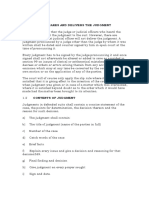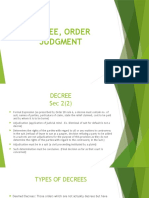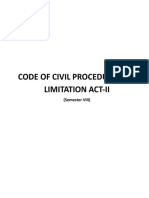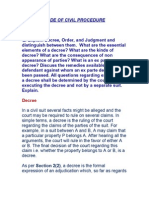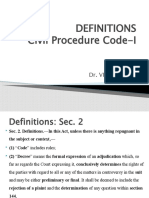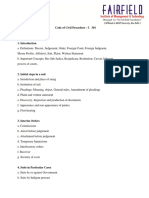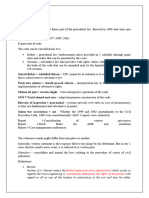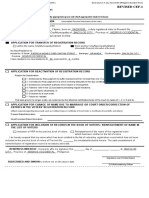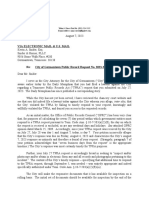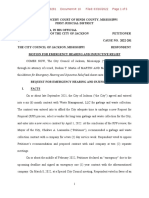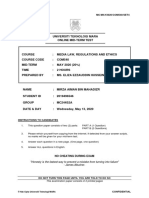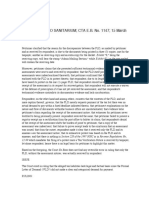LECTURE 16: JUDGMENT AND DECREE
CULMINATION OF TRIAL
�What is a judgment?
After hearing is completed, the court will
pronounce judgment
R.1-6 of O.21 deal with judgment and R.7-19 deal
with decrees
A Judgment is a final decision of the court on the
facts of the case at the end of the entire
procedure
� When writing a judgment, it is important that
1. One ensures there are no irregularities;
2. Judgement should not be vague and certain points
should not be left to inference;
3. It must be made of points raised in the pleadings in the
course of trial; and
4. It must record all points raised by all parties.
The statement of facts recorded in the judgment will
be the conclusive facts of the case
All judicial pronouncements must be judicial in nature,
sober, moderate and language must be used in a
restrained and dignified manner
Once a judgement has been read, the court becomes
functus officio.
� Under provisions of Section 99 for purposes
of correcting clerical or arithmetical errors or
errors arising from an accidental slip or
omission the judgment may at any time be
corrected by the court on its own motion or
through an application of any party
� O.21 requires that judgment be pronounced in
open court either at once or within 60 days from
the conclusion of the trial, notice of which shall
be given to the parties or their advocates.
Where judgment has not been given within 60
days, reasons thereof must be forwarded to the
Chief Justice and a date of judgment
immediately fixed (r.1)
� Judgment must be dated and signed, normally
and it will be read and signed by the person who
wrote it (r.2(1))
A judge is empowered to pronounce a judgment
which has been written and signed but not
pronounced by a predecessor (r.2(2))
It should be dated and signed by him in open
court at the time of pronouncing it.
Where the judgment is read by a different judge
who did not write the judgement the one who
reads it should date and countersign it upon
reading it (r.3(2))
�Content of judgment
A Judgment in a defended suit must contain:
(i) a concise statement of the facts of the case;
(ii) the points for determination;
(iii) the decisions on each of those points; and
(iv) the reasons for each of those decisions (r.4)
The Judgments must also show that the Judge
applied their mind intelligently
� In suits in which issues have been framed, the
court shall state its finding or decision, with the
reasons thereof, upon each separate issue (r.5)
Where there is a prayer for judgment the grant of
which would result in an alteration to the title of
land registered under any written law concerning
registered land, a certified copy of title shall be
produced in court before judgment is delivered
(r.6)
�Decree
A Decree is a technical translation of the
judgment capable of execution.
In the High Court the parties themselves draw up
the decree and take it back to court to be sealed.
The decree should be in agreement with the
judgment.
The decree should contain the number of the
suit, the names and descriptions of the parties,
and particulars of the claim and shall specify
the relief granted or other determination of the
suit (r.7(1))
� The decree shall also state by whom or out of what
property or in what proportion the costs incurred in the
suit are to be paid (r.7(2))
The court may direct that the costs payable to one
party by the other shall be set-off against any sum
which is admitted or found to be due from the former
to the latter (r.7(3))
A decree shall bear the date of the day
on which the judgment was delivered (r.8(1))
Any party to a suit in the High Court may prepare a
decree and give it to the other party for approval, if the
draft is approved by the parties, it shall be submitted
to the registrar who if satisfied it is drawn up in
accordance with the judgment shall sign and seal the
decree and it becomes the official decree (r.8(2))
� If one party does not receive an approval or rejection of
the decree within 7 days, the party making it shall give
notice in writing to that effect to the registrar and if
satisfied that the draft decree has been drafted in
accordance with the judgment, shall sign and seal the
decree accordingly
On any disagreement with the draft decree, any party
may file the draft decree marked as “for settlement”
and the registrar shall list it in chambers before the
judge who heard the case (or any other judge, if
unavailable) and give notice to the parties (r.8(4))
The procedure for preparation of decrees either in the
High Court or Subordinate Courts is harmonised by
importation of the current High Court procedure to
subordinate courts (r.8(5))
� Any order, whether in the High Court or in a
subordinate court, which is required to be drawn up,
shall be prepared and signed in like manner as a
decree (r.8(6))
Where the amount of costs has been—
(a) agreed between the parties;
(b) fixed by the judge or magistrate before the decree is
drawn;
(c) certified by the registrar under section 68A of the
Advocates (Remuneration) Order; or
(d) taxed by the court,
the amount of costs may be stated in the decree or
order (r.9(1))
� Where the subject-matter of the suit is
immovable property, the decree shall contain a
description of such property sufficient to identify
the same, and, where such property can be
identified by boundaries or by numbers in a
government record or survey, the decree shall
specify such boundaries or numbers (r.10)
Where the suit is in respect of movable property,
and the decree is for the delivery of such
property, the decree shall also state the amount
of money to be paid as an alternative if delivery
cannot be had (r.11)
� Where it is a decree for payment of money, the
court may for any sufficient reason at the time of
passing the decree, order that payment be
postponed or to be paid in instalments, with or
without interest (r.12(1))
Should the decree have been passed, the court
may on application of the judgment-debtor and
with or without permission of the decree-holder,
with sufficient cause shown, order the payment of
the amount decreed be postponed or made by
instalments on such terms as payment of interest,
attachment of property or taking of security from
the judgment-debtor, as it thinks fit (r.12(2))
� If the suit is for the recovery of possession of
immovable property and for rent or mesne profits, the
court may pass a decree—
(a) for the possession of the property;
(b) for the rent or mesne profits which have accrued on the
property before the institution of the suit or direct an
inquiry as to the rent or mesne profits;
(c) directing an inquiry as to rent or mesne profits from the
institution of such suit until—
(i) the delivery of possession to the decree-holder;
(ii) the relinquishment of possession by the judgment-
debtor having notified the decree-holder through the
court; or
(iii) the expiration of 3 years from the date of the decree,
whichever event first occurs (r.13(1))
� Where an inquiry has been conducted a final
decree in respect of the rent and mesne profits
shall be passed in accordance with the result of
the inquiry (r.13(2))
� If the decree made in the suit is for account or
administration of property, the court shall pass a
preliminary decree order the accounts or
inquiries to be taken or made (r.14(1))
While administering the property of a deceased
person, if that property proves to be insufficient
to pay of all his debts and liabilities, the decree-
holders will be considered in terms of priority as
secured and unsecured creditors as with respect
to estates of persons declared insolvent
Such persons will come in under the preliminary
decree and make their claims (r.14(2))
� If the decree made in the suit is for dissolution
of a partnership, or the taking of partnership
accounts, the court may before passing a final
decree, pass a preliminary decree,
(i) declaring the proportionate shares of the
parties,
(ii) fixing the day on which the partnership shall
stand dissolved, or be deemed to have been
dissolved, and
(iii)directing such accounts to be taken (r.15)
� The special directions by the court with regard to
taking account will involve the mode account the
account is to be taken and the court may direct
while taking account that the books of account be
taken as prima facie evidence of the truth of the
matter therein contained
The parties may object to this (r.17)
Where a court passes a decree for the partition of
property or for the separate possession of a share in
it, the court may, if the partition or separation
cannot be conveniently made without further
inquiry, pass a preliminary decree declaring the
rights of the parties interested in the property (r.18)
� Where the defendant has been allowed a set-
off against the plaintiff’s claim, the decree
shall state what amount is due to the plaintiff
and what amount is due to the defendant, and
shall be for the recovery of any sum which
appears to be due to either party (r.19(1))
� The registrar, or in the case of a subordinate
court, the presiding magistrate shall upon
written request by any of the parties or all of
them, and upon payment of requisite fees,
furnish certified copies of the judgment and
decree:
Nothing in this rule shall preclude the registrar or
the presiding magistrate from furnishing such
copies to any person upon sufficient cause being
shown for such request (r.20)





